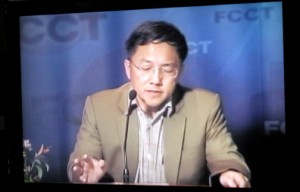The renewed emphasis on enforcement of Thailand’s lese majesté laws, which are used to prosecute individuals accused of insulting the royal family, is a topic on the front-burner of Thailand’s press these days. In a talk given by veteran Thai political observer Thongchai Winichakul (currently professor of Southeast Asian History at the University of Wisconsin), at Bangkok’s Foreign Correspondent’s Club of Thailand (FCCT) on February 13, 2012, he discussed the historical background of criminal code Article 112, which forms the legal basis for lese majesté prosecutions.
With at least one Special Branch officer in attendance, Thongchai was careful to point out that the problem didn’t lie with the Monarchy (the royal family), but rather with Monarchists, who he defined as “upper floor” operators within Thailand’s power structure. Although written into law in 1949, lese majesté laws were begun to be enforced in the 1975-1980 era against communists in Thailand. From that era, Thongchai suggests a “royalist democracy” philosophy gained influence, which he defines as “a regime whereby elite groups exploit the monarchy for their political legitimacy.” He also blames “hyper-royalism,” which he defines as “a cult and a hallucinogen for Thai through education and media machinations, resulting in self-censorship, hypocrisy, fear, and rumors.”
While admitting that a press conference on this controversial subject couldn’t have occurred in the recent past, Thongchai seeks to increase public discussions over Article 112. He’s not the only one. The Nitirat group, consisting of a number of scholars advocating for an amendment to Article 112, has, as of yesterday, received permission from Thammasat University to appear on its campus, within limitations, to hold activities. The foreign press is concerned as well, as at least one individual writing on Thai-related topics on an international website has been prosecuted and arrested in Thailand.
One element of Thongchai’s talk seems certain. Regardless of one’s public stance on Article 112, it is undeniable that the law does cause journalists to self-censor their writings on the Thai political climate, particularly on the subject of Thai succession, always a sensitive topic. Opinions of Article 112 are strong, and more than occasionally heated. Continued debate among politicians, the military, the press, and constitutional scholars would seem to remain the order of the day for the foreseeable future.

[…] first reported in 2012 on the concerns surrounding Article 112, know familiarly as Lèse-Majesté Law, generally agreed to […]
Joe Gordon, who was jailed for translating the book ‘The King Never Smiles,’ received a royal pardon: http://www.washingtonpost.com/world/asia_pacific/american-imprisoned-in-thailand-for-translating-banned-book-on-king-gets-royal-pardon-freed/2012/07/10/gJQARyAqbW_story.html